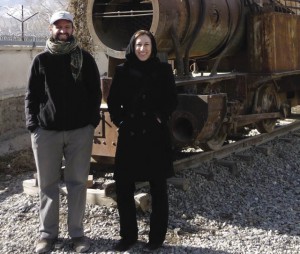
Glen Lapp '91 and EMU professor Lisa Schirch in Kabul, Afghanistan, in December, 2009. Schirch was in Afghanistan (and has returned there) for the 3D Security Initiative (3dsecurity.org). Photograph courtesy of lisa schirch
By Valerie Neff Newitt
Glen Lapp, BSN, RN, gave his life to the service of others
— literally. Lapp packed his nursing skills and his Mennonite-inspired commitment to a peaceful world and journeyed to Afghanistan in October 2008. Working for the Mennonite Central Committee (MCC), Akron, Pennsylvania, he helped to provide eye care and other medical support in the rugged, war-torn country.
Just two months before his anticipated October [2010] return to the U.S., Lapp participated in a two-week mobile eye clinic to test and treat people with eye diseases in Nuristan province at the invitation of the locals. But on an ill-fated return trip to his base in Kabul, Lapp, 40, and nine other team members perished. They were ambushed, robbed and riddled with bullets in a remote wooded area of Badakhshan province. The Taliban has claimed responsibility, and so have lesser insurgents. Yet the identity of the assailants is still unconfirmed. Authorities have said it might have been a band of rogue thieves who committed the heinous act.
Despite the tragic details of Lapp’s untimely death, it is his brief but purposeful life that will be his legacy.
“He was a dedicated nurse — both here and abroad. The loss of Glen and his colleagues is not only a loss for the people of Afghanistan, but for all of us in the global health community,” said Martha N. Hill, PhD, RN, FAAN, dean of Johns Hopkins University School of Nursing, Baltimore, where Lapp received a BS in 1995 in the school’s second degree accelerated program.
Lapp had earlier earned a degree from Eastern Mennonite University (EMU), in Harrisonburg, Virginia. [He was a ’91 math major at EMU.]
Ruth Zimmerman, LPN [’94 and MA ’02], was Lapp’s direct supervisor for MCC in Asia. She said Lapp’s interest in Afghanistan emerged after he visited a friend there in 2004.
“Glen loved the adventure of it. I’m sure this last trip to the outer reaches of Afghanistan — places where hardly any other people on earth have ever gone — was the dream of a lifetime for him. The team travelled by Jeep for hours and hours, then they walked, then they rode on horseback over mountain passes just to get there. They had to carry all their equipment with them. It was terribly hard to reach, and in the end, it was also dangerous.”
Zimmerman added wistfully, “Glen was the ideal nurse, very self contained and capable, as well as extremely compassionate – and above all, humble about it.”
Lisa Schirch, on faculty of EMU’s graduate program in justice and peacebuilding, is also a teacher at the University of Kabul. She’s been to that distant capital city three times since December, staying in the same guest house as Lapp, where they shared meals, conversations and hours exploring Kabul together.
Just before his death, Lapp was preparing an exit report to be filed with Mennonite Central Committee upon his return to the U.S. And while the report was never completed, it did speak to Lapp’s ongoing commitment to service. He said in part: “The main thing expats can do is to be a presence in the country [Afghanistan]. Treating people with respect and with love.”
Schirch said [that] “Glen was very proud to be a nurse; he chose this profession to serve others. And what’s more, he chose to do it in a war zone. He was aware of the danger, but he was willing to take the risk. I don’t think his life was wasted, I feel it’s a testament to his character, his beliefs and his work.”
Glen Lapp was a member of Community Mennonite Church in Lancaster, Pennsylvania, where his parents Mary and Marvin ’72 Lapp live. This article was excerpted with permission from Advance for Nurses at nursing.advanceweb.com, where the full version was posted on August 11, 2010. Valerie Newitt is the magazine’s senior associate editor.